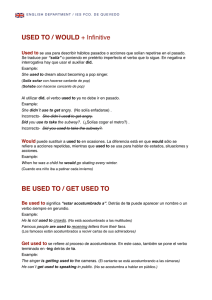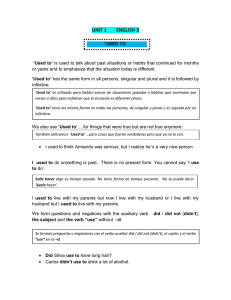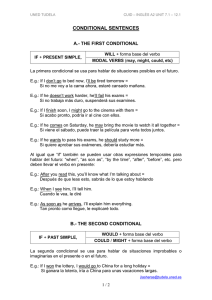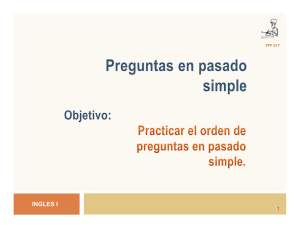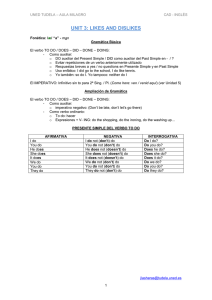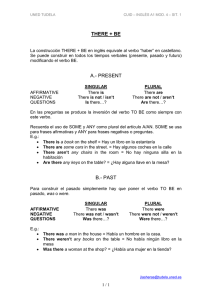Modal Verbs 1. Can / Can`t
Anuncio
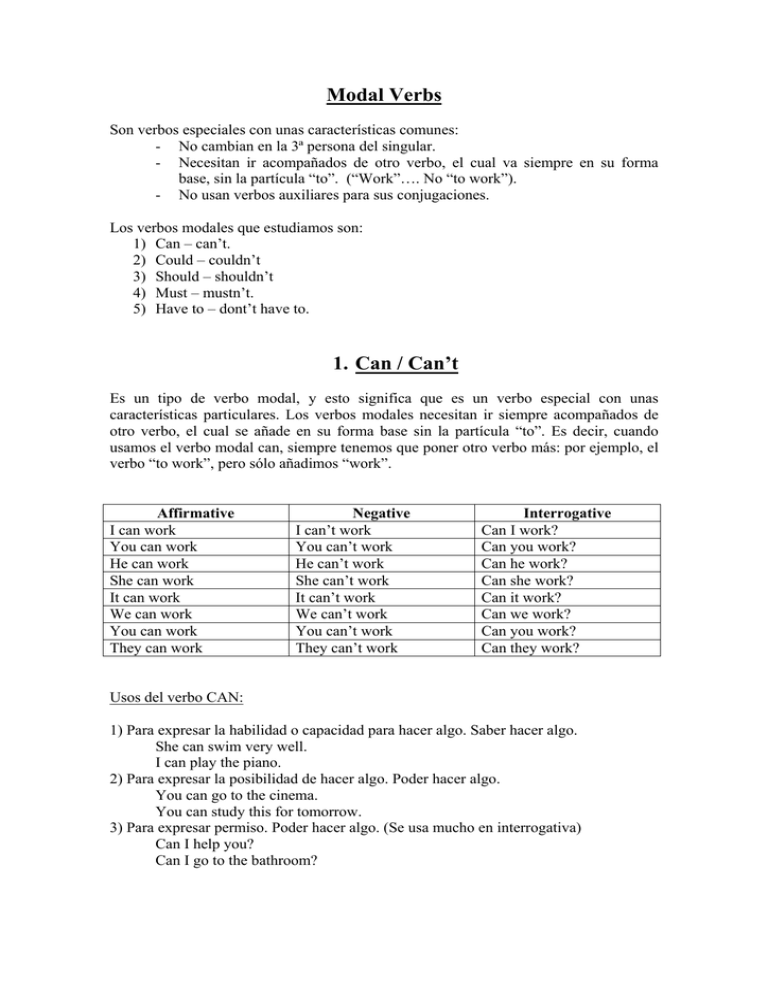
Modal Verbs Son verbos especiales con unas características comunes: - No cambian en la 3ª persona del singular. - Necesitan ir acompañados de otro verbo, el cual va siempre en su forma base, sin la partícula “to”. (“Work”…. No “to work”). - No usan verbos auxiliares para sus conjugaciones. Los verbos modales que estudiamos son: 1) Can – can’t. 2) Could – couldn’t 3) Should – shouldn’t 4) Must – mustn’t. 5) Have to – dont’t have to. 1. Can / Can’t Es un tipo de verbo modal, y esto significa que es un verbo especial con unas características particulares. Los verbos modales necesitan ir siempre acompañados de otro verbo, el cual se añade en su forma base sin la partícula “to”. Es decir, cuando usamos el verbo modal can, siempre tenemos que poner otro verbo más: por ejemplo, el verbo “to work”, pero sólo añadimos “work”. Affirmative I can work You can work He can work She can work It can work We can work You can work They can work Negative I can’t work You can’t work He can’t work She can’t work It can’t work We can’t work You can’t work They can’t work Interrogative Can I work? Can you work? Can he work? Can she work? Can it work? Can we work? Can you work? Can they work? Usos del verbo CAN: 1) Para expresar la habilidad o capacidad para hacer algo. Saber hacer algo. She can swim very well. I can play the piano. 2) Para expresar la posibilidad de hacer algo. Poder hacer algo. You can go to the cinema. You can study this for tomorrow. 3) Para expresar permiso. Poder hacer algo. (Se usa mucho en interrogativa) Can I help you? Can I go to the bathroom? 2. Could / Couldn’t Es el pasado del verbo modal can, por lo que expresa habilidad y posibilidad en el pasado. She could read when she was tour. In the past, robots couldn’t play music. Se usa para expresar algo posible pero poco probable. He could be at home. O para expresar una habilidad (natural o aprendida) que se tuvo en el pasado. She could ran very fast when she was a girl. También lo podemos utilizar para pedir permiso en frases interrogativas, y queda de una forma más educada que utilizando can. Could you help me, please? Affirmative I could read You could read He could read She could read It could read We could read You could read They could read Negative I couldn’t read You couldn’t read He couldn’t read She couldn’t read It couldn’t read We couldn’t read You couldn’t read They couldn’t read Interrogative Could I read…? Could you read..? Could he read…? Could she read…? Could it read…? Could we read…? Could you read…? Could they read…? Negative Interrogative I you he she it we you they Verb: Affirmative I You He She It We You They I You He She It We You They ? ? ? ? ? ? ? ? 3. Should / Shouldn’t Utilizamos este verbo modal para dar consejos o indicar lo que se debería hacer, tanto en afirmativa como en negativa. You should wear glasses. You shouldn’t be here. Affirmative I should go You should go He should go She should go It should go We should go You should go They should go Negative I shouldn’t go You shouldn’t go He shouldn’t go She shouldn’t go It shouldn’t go We shouldn’t go You shouldn’t go They shouldn’t go Interrogative Should I go…? Should you go…? Should he go…? Should she go…? Should it go…? Should we go…? Should you go? Should they go…? Negative Interrogative I you he she it we you they Verb: Affirmative I You He She It We You They I You He She It We You They ? ? ? ? ? ? ? ? 4. Must / Mustn’t Es otro tipo de verbo modal, y esto significa que es un verbo especial con unas características particulares. Los verbos modales necesitan ir siempre acompañados de otro verbo, el cual se añade en su forma base sin la partícula “to”. Es decir, cuando usamos el verbo modal can, siempre tenemos que poner otro verbo más: por ejemplo, el verbo “to work”, pero sólo añadimos “work”. Como verás, se conjuga igual que el modal can /can’t. Lo importante es conocer bien su significado y sus usos, porque de ello depende que se use un modal u otro. En afirmativa normalmente expresa la obligación o necesidad fuerte de hacer algo, pues significa “deber”. You must use the diskette. En negativa tiene un significado totalmente distinto ya que expresa prohibición, algo que no está permitido o algo que no se debe hacer por no ser conveniente o correcto hacerlo. You mustn’t use the phone. Must y mustn’t puede usarse también para dar consejos. You mustn’t give up. Affirmative I must use You must use He must use She must use It must use We must use You must use They must use Negative I mustn’t use You mustn’t use He mustn’t use She mustn’t use It mustn’t use We mustn’t use You mustn’t use They mustn’t use Interrogative Must I use…? Must you use…? Must he use…? Must she use…? Must it use…? Must we use…? Must you use…? Must they use…? Negative Interrogative I you he she it we you they Verb: Affirmative I You He She It We You They I You He She It We You They ? ? ? ? ? ? ? ? 5. Have to / Don’t have to Es otro tipo de verbo modal, y esto significa que es un verbo especial con unas características particulares. Los verbos modales necesitan ir siempre acompañados de otro verbo, el cual se añade en su forma base sin la partícula “to”. Es decir, cuando usamos el verbo modal can, siempre tenemos que poner otro verbo más: por ejemplo, el verbo “to work”, pero sólo añadimos “work”. El uso de este verbo modal en su forma afirmativa (have to) implica que es necesario hacer algo, bien porque una norma lo establece, o bien porque las circunstancias obligan a ello. En su forma negativa (don´t have to) indic que no hay necesidad de hacer algo. In Great Britain, people have to drive on the left. We don’t have to walk far to school. (Because we live near it) Affirmative I have to read You have to read He has to read She has to read It has to read We have to read You have to read They have to read Negative I don’t have to read You don’t have to read He doesn’t have to read She doesn’t have to read It doesn’t have to read We don’t have to read You don’t have to read They don’t have to read Interrogative Have I got to read…? Have you got to read..? Has he got to read…? Has she got to read…? Has it got to read…? Have we got to read…? Have you got to read…? Have they got to read…? Verb: Affirmative I You He She It We You They Negative I You He She It We You They Interrogative I you he she it we you they ? ? ? ? ? ? ? ?
